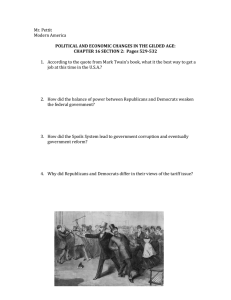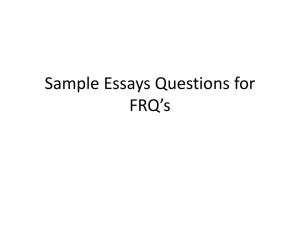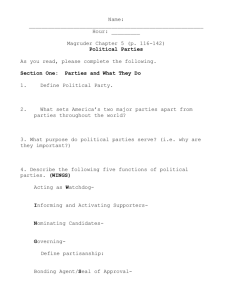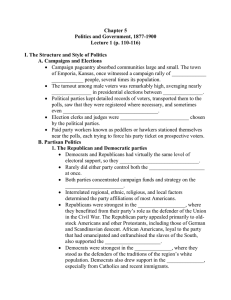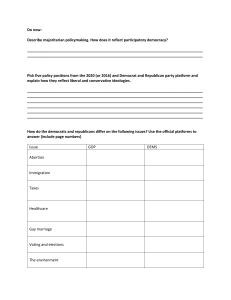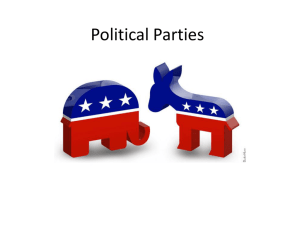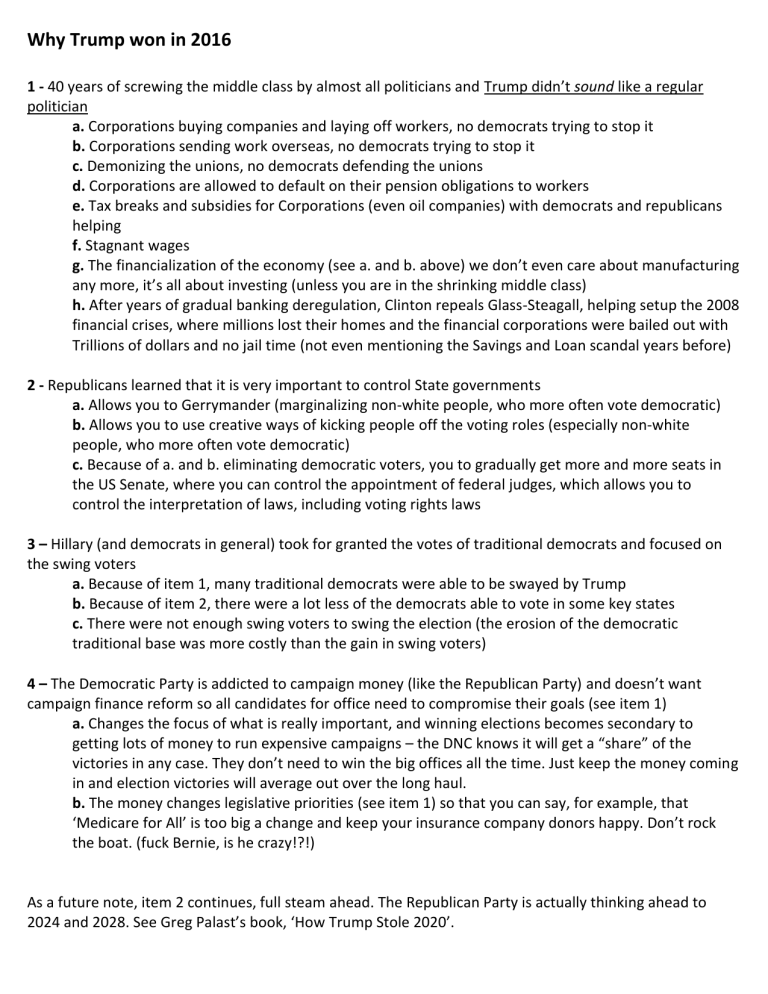
Why Trump won in 2016 1 - 40 years of screwing the middle class by almost all politicians and Trump didn’t sound like a regular politician a. Corporations buying companies and laying off workers, no democrats trying to stop it b. Corporations sending work overseas, no democrats trying to stop it c. Demonizing the unions, no democrats defending the unions d. Corporations are allowed to default on their pension obligations to workers e. Tax breaks and subsidies for Corporations (even oil companies) with democrats and republicans helping f. Stagnant wages g. The financialization of the economy (see a. and b. above) we don’t even care about manufacturing any more, it’s all about investing (unless you are in the shrinking middle class) h. After years of gradual banking deregulation, Clinton repeals Glass-Steagall, helping setup the 2008 financial crises, where millions lost their homes and the financial corporations were bailed out with Trillions of dollars and no jail time (not even mentioning the Savings and Loan scandal years before) 2 - Republicans learned that it is very important to control State governments a. Allows you to Gerrymander (marginalizing non-white people, who more often vote democratic) b. Allows you to use creative ways of kicking people off the voting roles (especially non-white people, who more often vote democratic) c. Because of a. and b. eliminating democratic voters, you to gradually get more and more seats in the US Senate, where you can control the appointment of federal judges, which allows you to control the interpretation of laws, including voting rights laws 3 – Hillary (and democrats in general) took for granted the votes of traditional democrats and focused on the swing voters a. Because of item 1, many traditional democrats were able to be swayed by Trump b. Because of item 2, there were a lot less of the democrats able to vote in some key states c. There were not enough swing voters to swing the election (the erosion of the democratic traditional base was more costly than the gain in swing voters) 4 – The Democratic Party is addicted to campaign money (like the Republican Party) and doesn’t want campaign finance reform so all candidates for office need to compromise their goals (see item 1) a. Changes the focus of what is really important, and winning elections becomes secondary to getting lots of money to run expensive campaigns – the DNC knows it will get a “share” of the victories in any case. They don’t need to win the big offices all the time. Just keep the money coming in and election victories will average out over the long haul. b. The money changes legislative priorities (see item 1) so that you can say, for example, that ‘Medicare for All’ is too big a change and keep your insurance company donors happy. Don’t rock the boat. (fuck Bernie, is he crazy!?!) As a future note, item 2 continues, full steam ahead. The Republican Party is actually thinking ahead to 2024 and 2028. See Greg Palast’s book, ‘How Trump Stole 2020’. RESPONSES Schneider, Chuck Sent: Thursday, August 27, 2020 3:46 PM Should have been titled – Why the Democrats lost in 2016. Basically agree w/ quite a bit presented here – especially how Republicans w/ backing from extreme mega-donors who many times set up their own political action committees (ie: the Koch brothers) have been intensely focused on the long game. Not only state governments but local, down to even school board levels. I do think the Democrats have taken notice of this and are more and more focusing on local and state races. Democrats have always been associated w/ unions – sometimes to the detriment of the Democrats. Even if Democrats had been more forceful defending unions I don’t think it would have helped. Reagan helped kill the unions w/ the complicity of the courts – courts decided that while it was still illegal to fire a union member on strike it WAS legal to hire a permanent replacement – that gutted a great deal of whatever power a union had. Union power also faded w/ the loss of manufacturing jobs. Could Democrats have fought that? Sure, to a point, but market forces being what they are, we are losing more manufacturing jobs to automation than to relocation – how do you prevent a factory from using robots? I agree part of Trump’s appeal was he didn’t sound like a politician. He also had some appeal because of the fiction that he was a sound businessman – despite 6 bankruptcies and the fact no U.S. bank will lend him money anymore – and the romanticized idea that you can run government like a business even though there is no other business in the world that has 435 co-owners who can’t be fired at the whim of the chief executive. Hillary did run a lackluster campaign, but the decades long demonization of her (whether you believe she deserved it or not) was a bigger factor in my opinion. Trump on the other hand had been the beneficiary of a carefully scripted “reality” show for several years cementing the illusion he was a highly competent businessman. And let’s throw in the Russian meddling w/ Julian Assange’s help as a factor too. (The recent bipartisan Senate investigation pointed out Roger Stone reached out to Assange after hearing about the Access Hollywood tapes and 30 minutes after those tapes became public the first batch of leaked campaign documents came out, taking some of the attention and heat off of Trump’s campaign.) I think your points on #4 are a bit of a simplification – is it the chance of success that chases money or money that chases success – candidates compromise goals because they think it will garner them more votes or better polling numbers – the more your chance of success the more money you attract. Big money does not always translate to success – ie: Michael Bloomberg. It's not quite that clear cut obviously – candidates that antagonize a party’s big donors will get no help from party leadership – would Bernie have gotten the nomination in 2016 if the leadership had been neutral – personally I don’t think so – you don’t label yourself as a Socialist and expect to win in this country – too many people are too clueless as to what it means. Big ideas energize but also polarize. Saying the Democrats lost because they no longer reflected the concerns of the shrinking middle and blue collar labor classes I think is partially correct. Though Trump did pay attention to them – his real coup was scapegoating that reality by blaming immigration and regulations – focusing the attention not on the truth, that the elite (that he was a part of) were to blame, but by lying and preying on the growing mistrust of government in general and throwing in some race baiting for good measure on top of that. But let’s not forget that Trump actually lost the election by 3 million votes – that’s not a trivial number. He won the Electoral College by winning 4 swing states – by a cumulative total of only 108,000 votes – less than 1% in each state that put him in the Oval office. How much of that was people just saying the heck with it - let’s give a non-politician a shot vs. the big picture you paint, ie. the Democrats blew the election due to hubris, neglect, and the misreading the socio-economic climate? Kathy Fredricks Oswald Thu 8/27/2020 3:55 PM Hi, Bill. Your theme seems to be that the Democrats are solely responsible for Trump’s win in 2016. I take issue with that. What about corporate greed that put too much emphasis on shareholder profits and not enough emphasis on fair wages of regular workers? What about James Comey’s last minute communication about Hillary Clinton’s emails? What about Bernie Sanders staying in the Democratic race too long and then endorsing Clinton only halfheartedly ? What about racism of those who freaked out because we had a black president ? What about sexism of those who wouldn’t vote for a woman ? What about the indifference or laziness of people who didn’t do their homework to study the candidates ? What about those who didn’t bother to vote? What do you see for upcoming election ? ME: Friday, August 28, 2020 12:34 AM My theme is not that the democrats are solely responsible for losing the election, but they are profoundly responsible for it. I take it as obvious that the republicans will martial all their powers to win. My point is that the democrats did NOT do all they could have to win OVER THE LAST 40 YEARS. You cannot alienate and ignore your supposed core voters for that long and expect an engaged electorate for your candidates. As a party then, you are leaving the voters to come up with their own motivations, and it worked for Obama and not for Hillary. Blaming Bernie for Hillary’s loss seems to ignore the fact that she did not try to energize her own base. Per Rachel Bitecofer, “Sanders found himself unable to rein in the deep mistrust many of his supporters held for Clinton. Yet the Clinton team felt sure that the specter of a Trump presidency would be more than enough to bring reluctant Sanders supporters back. Clinton and her campaign managers decided to gear their strategy to the middle of the electorate, rather than energizing their own base.” Why did they mistrust her? How about the DNC super delegates changing some of the primary outcomes. What did she do to win them over? Nothing. I think over all, that item 2 (a and b) are the by far the most powerful causes of Trump’s win. The republicans started doing item 2b twenty years ago. Remember Bush v. Gore in Florida, there were a lot of eliminated black and Hispanic voters there. These republican bastards have been working hard at this and getting better and better at it. Why didn’t a mature and intelligent Democratic Party pay attention to what their adversaries were doing? Where were their lawyers during this time? My point about the unions was not that the democrats could have prevented the manufacturing unions demise, but that they did not seem to put up much of a fight. It was that the democrats alienated the middle class. If you stand up and fight for a group and lose, they will remember that you fought for them. If you have excuses why you are not going to fight (ultimately based on “we will just lose this fight”) then you show you lack of empathy. There was an interesting podcast from ‘Hidden Brain’ called ‘Voting with your middle finger’ that talked about this alienation. Expanding union memberships can be via white collar workers too. And what about doing something for the Walmart type situations where the company unofficially harasses you if you try to start up a union. I believe there are many ways to show support and even help increase union memberships. I am saying I don’t recall that being a news item during the last 40 years. I have not heard enough about the Russian stuff to feel/think it had a big impact. Although I was shocked when the FBI head released the allegations about Hillary’s emails late in the year (which never came to anything). The point of item 4 was that you start out chasing success, you see republicans getting lots of money which helps with their elections. So you look for your big money. When you have large and complex organizations (DNC and other democratic organizations) devoting much time and effort getting money to get elected, you begin to think if there is no money there is no real campaign. And large organizations begin to have a life of their own, people in the DNC want to keep their jobs, and getting money is way more reliable way of showing that you are doing good work for the party, than actually getting someone elected. I don’t really see it as a significant oversimplification, more like a subtle undermining of the candidates and the party’s willingness to stand for their ideals. It is a slow erosion, over a period of years the democratic party has turned into the moderate republican party of the mid-twentieth century. One of the things I realized many years ago was the focus on money means your view of the voter is that they are not very engaged (or intelligent) at all. I don’t need dozens of TV ads to convince me to vote for someone. No one does, but usually, it seems to work, especially if you can’t stay relatively close in spending. The idea that the democrats will win their share of elections and don’t care to fight too hard for them seems wrong-headed. But, (from Palast’s book ‘How Trump Stole 2020’), there is a story that Jill Stein was raising $9,000,000 for pay for a recount in Michigan (and Wisconsin and Pennsylvania). Trump’s lawyers sued in Michigan, saying that no matter how the recount went Jill Stein would still lose, so Stein had no ‘standing’ to demand the recount. In the courtroom the judge asked Hillary Clinton’s lawyers (yes, they were there) if she would agree to the ballot count (obviously she had ‘standing’) and her lawyers said we are here ‘just to observe’. WHAT THE FUCK ??? So I say item 4 has some ‘standing’. Schneider, Chuck Fri 8/28/2020 4:36 PM Basically we agree on most of the broader issues. I just think there were things specifically related to Hillary that caused her loss more than Democratic malpractice, (ie: her demonization was a decades long process, beginning w/ the right wing’s “horror” that she was not interested in a traditional first lady role, continuing w/ the Kenneth Starr debacle, being targeted by the left for not being feminist enough during Bill’s many horny dog scandals – finally the impeachment that led to a certain amount of “Clinton fatigue” across the board, etc… - I don’t blame Bernie for Hillary’s loss at all – I think the Comey bullshit, the Russian interference, the Trump as a nonpolitician meme were bigger factors) but I agree if they had done their jobs correctly they MAY have been able to overcome those other issues I definitely agree that the Republicans paid more attention and were more effective when it came to gerrymandering house districts – they weaponized that approach long before anyone else thought to. I do think there was a naiveté among Democrats, even after Bush/Gore about how flat out cut throat Republicans were going to be when it came to disenfranchising voters. And there was and continues to be a definite limpness in their response which I can’t explain – though personally I don’t think it’s a matter of “we don’t care if we win or lose as long as the money comes in” – of course that might be my naiveté, but if you never win then no one will give you money anyway. As far as the Jill Stein thing, my reading of it was she filed her motion after the Clinton campaign decided to not seek a recount, and that after Stein filed the motion the Clinton campaign said they supported her. The Clinton campaign basically decided there was no evidence of widespread fraud, no evidence to think a recount was going to matter as all 3 states would have had to have their election results flipped for her to win the election (and the margin in Michigan was so large it was very unlikely to happen) so they decided not to spend the money and time. But – when Jill Stein said she’d go for it they jumped on board. mac gretz Fri 8/28/2020 7:17 PM Bill: I think your brother, Chuck, made many of the cases I would have made if I were quicker on the draw: Trump didn't win, the democrat's missteps and fickle fate conspired to beat the Dems. Many of the points you made are valid and added together may have spelled doom for the dems. But I am reading a book by Ezra Klein (Why We Are So Polarized) that makes the case that policies are only tangential determinants in folks making electoral decisions. His thesis is that we have for at least two generations been primarily prisoners of heredity and mostly follow our family predecessors’ party choices. But to add my $0.02 worth: this was a change election after two terms of a polarizing president (White fear of a Black planet), massive free media for "45", wage stagnation and the revenge of Hillary's "Basket of Deplorables". Add Comey's October surprise, Russian meddling and collusion with the rethug campaign, Johnson & Stein and even 3 million more votes couldn't carry the electoral college day. Thanks for making me exercise some waning faculties. Stay safe and well
